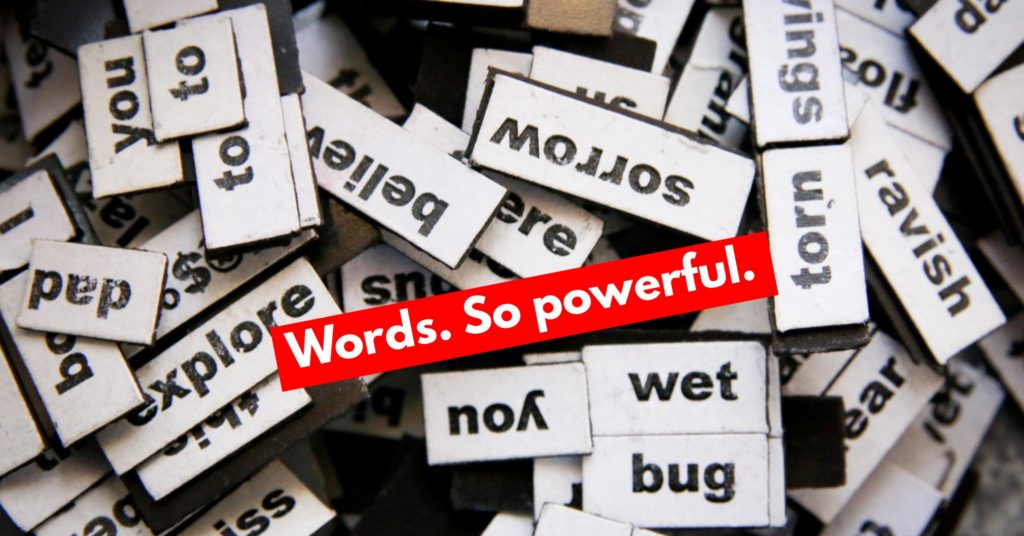In the autumn of 2019, my mum was in serious cognitive decline. She was finding it increasingly difficult to retrieve her memories or find the right words. She had even forgotten the name of the house she’d lived in for 25 years. As she was losing her grip on language, I started reflecting on its power. And that’s when I found this quote, from spiritual teacher Jeff Brown:
Words. So powerful. They can crush a heart or heal it. They can shame a soul or liberate it. They can shatter dreams or energise them. They can obstruct connection or invite it. They can create defences or melt them. We have to use words wisely.
This quote, which so perfectly encapsulates the potency of language and why we need to take responsibility for the words we say and write, was my call to adventure. It sent me on a journey that started with a list of words that held a particular significance for me at different times in my life – from first words, childhood words and teenage words to adult words, midlife words and wise words.
I ended up with a list of 56 words that had impacted me in positive and negative ways. My plan was to write a short essay about each of them, in order to make a broader point about how we use language as well as how we receive it, understand it and respond to it. So, I took myself off to an Airbnb in Oxfordshire to begin writing what I hoped would become a book. I already had a working title – a whimsical one that I hoped would provoke curiosity – Night Night Washing Machine: A Life in Words.
Writing about my childhood words was easy: sunshine, popular and shy (even though, in hindsight, shy made me angry). But just like puberty, the teenage words were harder: messy, crush… and then THAT word. The One Word That Rules Them All.
Stroke.
I’ve written so many stories about that word over the years, but explaining why this was the word that has haunted my entire life was exhausting. Here are the facts: when I was 16 and my dad was 46, he had a devastating stroke that left him physically, emotionally and psychologically damaged. When I was able to, here’s what I wrote in conclusion:
Stroke – so short yet so dynamic, with so many meanings. And so ironic that one of those meanings is so gentle, so soothing. Yet in my life it has been a cutting, brutal and devastating word.
With that word out of the way, it was plain sailing for a while. I breezed through sing, perform, single and secretary. It was turning into a memoir, a meditation and a reflection – a book, after all. Then Christmas came, with the bleak realisation that I could no longer ensure the safety of my mum in her own home. After a difficult conversation with my siblings, we found her a lovely care home.
At this point, writing about my life began to feel self-indulgent, so the book ground to a halt while we prepared Mum for the move at the end of January 2020. A few days into February, she slipped off a chair and broke her hip. She was in hospital for several weeks and returned to the care home in a fragile state, just in time for the first lockdown.
It was the combined shock of Mum’s rapid decline and the pandemic that made me decide to move in with my brother that March. While there, I began to observe how our vocabulary was being transformed by Covid, and wrote a series of articles on these new words. That’s what got me back into the book. As lockdown continued, we were finding it hard to communicate with Mum over Skype. There were times when she barely said a word. But there were no words to describe how that made me feel.
That summer, I finished the first draft of the book. I thought I’d let it bake for a while, with every intention of self-publishing later in 2020. In August, were finally able to see Mum in person, at a distance. Over the course of a few weeks, we watched helplessly as she slowly slipped away.
She died that September, and all I could write about was grief.
For months, the book became a stranger. We didn’t meet again until April 2021, when I renewed my commitment and discovered that the book wanted to grow, to embrace other words. Mum’s life had already been reduced to words; her name carved into a memorial stone. Meanwhile, I continue to bring the words of my life to life. I want people to understand my connection with these words before my connection with language starts to disappear.
So, why on earth is it called Night Night Washing Machine? Because that’s what I used to say before Mum carried me up to bed when I was a toddler. And it is, of course, dedicated to her – Lucille Cynthia Glick. I’m going to bookend this story with another quote, which I found this week. It’s from Brene Brown’s new book, Atlas of the Heart, and it could have been written about my book too:
Language is a portal that transports us to a universe of new choices and second chances – a universe where we can share the stories of our bravest and most heartbreaking moments with each other in a way that builds connection.
And that’s what I hope my book will do – build meaningful connection. I think Mum might have had a few words to say about that too.

Thanks for such an honest, powerful and moving post Bev
Thank you David – I’m glad it landed for you.